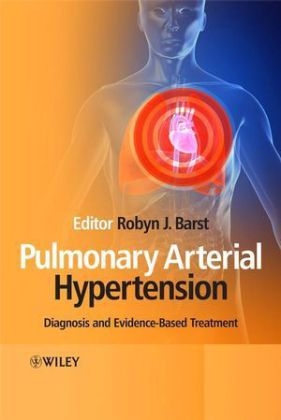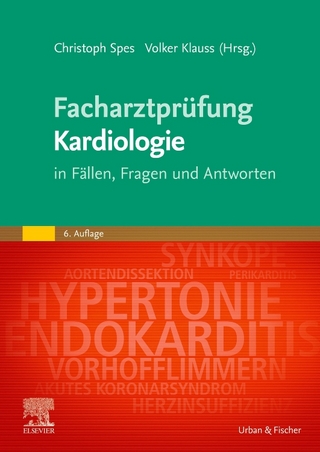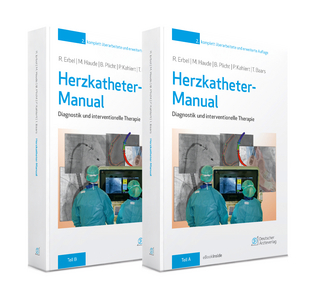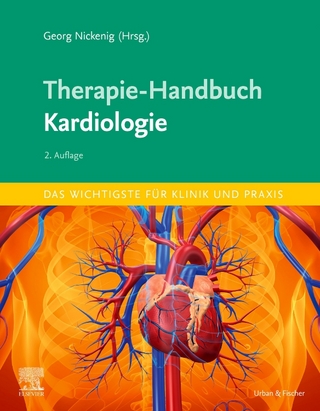
Pulmonary Arterial Hypertension
John Wiley & Sons Inc (Verlag)
978-0-470-05972-2 (ISBN)
First book dedicated to this disease, previously thought to be incurable, but with the advent of new drugs, now amenable to management and a much improved prognosis for patients
From the PAH Association, the leading experts in field
Incorporates the latest AACP management guidelines
Includes evidence-based treatment algorithms based on the recently updated ACCP Guidelines for Medical Treatment
Aimed at specialists in pulmonology and cardiovascular disease, this volume provides the clinician with the most up to date information on the effective management of PAH
Robyn J. Barst, MD, Professor of Pediatrics (in Medicine); Director, Pulmonary Hypertension Center, Columbia University Medical Center, New York, NY, USA Dr Barst is chair of the 'Scientific Leadership Council' of the Pulmonary Hypertension Association, a group of more than twenty internationally recognized leaders in the field of PAH. The mission of the SLC is 'to provide medical and scientific leadership for the Association by proactively facilitating the development of new knowledge about pulmonary hypertension, actively disseminating knowledge about pulmonary hypertension to medical and public audiences, and advocating and raising awareness about pulmonary hypertension. The editor and contributors are all members of the SLC, and include many well-known names including Lewis Rubin, George Simmoneau, Nazarino Galie, and David Badesch. This text is intended to be the 'official' work on the subject. Further evidence of the standing of the contributors is the medical centers involved in the SLC, which include the Mayo Clinic, Columbia Presbyterian Medical Center, University of California San Diego, UCLA, Duke, Rush Presbyterian, University of Colorado, University of Utah, Vanderbilt, the University of Alabama at Birmingham, and the University of Pennsylvania. The SLC also has international members from Italy, Ireland, Germany, and Canada. Dr Barst is? on the Editorial Board of Circulation, the official Journal of the American Heart Association, and for Chest, the official journal for the American Thoracic Society. Member of European Society of Cardiology Task Force for Primary Pulmonary Hypertension, Board Member of the International Society for Heart and Lung Transplantation.
Preface Contributors.
1 Introduction (Robyn J. Barst).
2 Diagnosis and assessment of pulmonary arterial hypertension (Michael D. McGoon, Adam Torbicki and Ronald J. Oudiz).
2.1 Hemodynamics of pulmonary hypertension.
2.2 Venice classification.
2.3 Overview of the diagnostic process (algorithm).
2.4 Screening (identifying a pre-existing risk).
2.5 Detection (discovering pulmonary hypertension).
2.6 Definition (diagnosing the clinical context).
2.7 Prediction (estimating prognosis).
2.8 Principles of follow-up (evaluating and responding to outcome).
2.9 Specific tests in the evaluation of pulmonary hypertension.
3 Conventional therapy in pulmonary arterial hypertension (Richard N. Channick).
3.1 Calcium channel antagonists.
3.2 Diuretics.
3.3 Warfarin.
3.4 Supplemental oxygen.
3.5 Inotropic therapy.
3.6 General measures.
3.7 Conclusions.
4 Prostanoid treatment for pulmonary arterial hypertension (Olivier Sitbon and Gérald Simonneau).
4.1 Epoprostenol.
4.2 Treprostinil.
4.3 Iloprost.
4.4 Beraprost.
4.5 Treatment selection.
4.6 Conclusions.
5 Endothelin receptor antagonists in pulmonary arterial hypertension (David B. Badesch and Marc Humbert).
5.1 Bosentan.
5.2 Sitaxsentan.
5.3 Ambrisentan.
5.4 Safety and tolerability with endothelin receptor antagonists.
5.5 Conclusions.
6 Phosphodiesterase-5 inhibitors in pulmonary arterial hypertension (Hossein A. Ghofrani, Werner Seeger and Friedrich Grimminger).
6.1 The origins of phosphodiesterase-5 inhibitor development.
6.2 Pulmonary hypertension as a new indication for phosphodiesterase-5 inhibitor treatment.
6.3 Role of phosphodiesterase-5 in the pulmonary vasculature.
6.4 Clinical experience with sildenafil for the treatment of chronic pulmonary hypertension.
6.5 Pivotal trial and approval of sildenafil for the treatment of pulmonary arterial hypertension (SUPER-1 study).
6.6 Other phosphodiesterase-5 inhibitors.
6.7 Combination therapy.
6.8 Potential new indications for phosphodiesterase-5 inhibitors outside pulmonary arterial hypertension.
6.9 Conclusions.
7 Combination therapy for pulmonary arterial hypertension (Anne Keogh and Marius Hoeper).
7.1 Background.
7.2 Combination therapy to date.
7.3 Conclusions.
8 Interventional and surgical modalities of treatment for pulmonary arterial hypertension (Julio Sandoval and Ramona Doyle).
8.1 Introduction.
8.2 Atrial septostomy.
8.3 Pulmonary endarterectomy in chronic thromboembolic pulmonary hypertension.
8.4 Lung transplantation for pulmonary hypertension.
8.5 Conclusions.
9 End points and clinical trial design in pulmonary arterial hypertension: Clinical and regulatory perspectives (Andrew J. Peacock).
9.1 Introduction.
9.2 Trial design.
9.3 End points in trials of therapy for pulmonary arterial hypertension.
9.4 Conclusions.
10 Comparative analysis of clinical trials and evidence-based treatment algorithm for pulmonary arterial hypertension (Nazzareno Galiè, Alessandra Manes, Naushad Hirani and Robert Naeije).
10.1 Introduction.
10.2 Randomized controlled studies.
10.3 Long-term continuation studies.
10.4 Combination studies.
10.5 Evidence-based treatment algorithm.
10.6 Conclusions.
11 Diagnosis and assessment of non-pulmonary arterial hypertension masquerading as idiopathic pulmonary arterial hypertension: Diastolic heart failure - evaluation and interactions (Mardi Gomberg-Maitland and Stuart Rich).
11.1 Definition of heart failure.
11.2 Epidemiology.
11.3 Physiology.
11.4 Evaluation of diastolic heart failure: Invasive and noninvasive techniques.
11.5 Diagnosis and treatment of diastolic dysfunction.
11.6 Pulmonary hypertension and diastolic dysfunction.
11.7 Conclusions.
12 Treatment of pulmonary arterial hypertension: A look to the future (Lewis J. Rubin).
12.1 Therapy of pulmonary arterial hypertension.
12.2 Measuring outcomes and monitoring the course of therapy.
12.3 Conclusions.
Index.
| Erscheint lt. Verlag | 1.7.2008 |
|---|---|
| Verlagsort | New York |
| Sprache | englisch |
| Maße | 177 x 254 mm |
| Gewicht | 635 g |
| Einbandart | gebunden |
| Themenwelt | Medizinische Fachgebiete ► Innere Medizin ► Kardiologie / Angiologie |
| Medizinische Fachgebiete ► Innere Medizin ► Pneumologie | |
| ISBN-10 | 0-470-05972-9 / 0470059729 |
| ISBN-13 | 978-0-470-05972-2 / 9780470059722 |
| Zustand | Neuware |
| Informationen gemäß Produktsicherheitsverordnung (GPSR) | |
| Haben Sie eine Frage zum Produkt? |
aus dem Bereich


